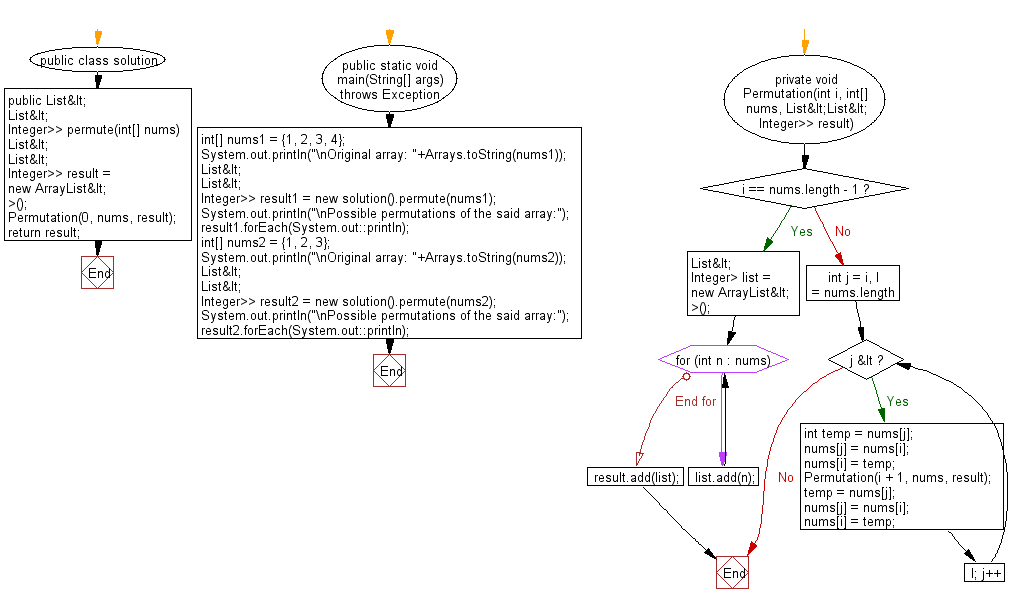Java Array Exercises: Create all possible permutations of a given array of distinct integers
Java Array: Exercise-68 with Solution
Write a Java program to create all possible permutations of a given array of distinct integers.
Example:
Input :
nums1 = {1, 2, 3, 4}
nums2 = {1, 2, 3}
Output:
Possible permutations of the said array:
[1, 2, 3, 4]
[1, 2, 4, 3]
[1, 3, 2, 4]
[1, 3, 4, 2]
....
[4, 3, 2, 1]
[4, 3, 1, 2]
[4, 1, 3, 2]
[4, 1, 2, 3]
Possible permutations of the said array:
[1, 2, 3]
[1, 3, 2]
[2, 1, 3]
[2, 3, 1]
[3, 2, 1]
[3, 1, 2]
Sample Solution:
Java Code:
import java.util.*;
import java.util.List;
public class solution {
public static void main(String[] args) throws Exception {
int[] nums1 = {1, 2, 3, 4};
System.out.println("\nOriginal array: "+Arrays.toString(nums1));
List<List<Integer>> result1 = new solution().permute(nums1);
System.out.println("\nPossible permutations of the said array:");
result1.forEach(System.out::println);
int[] nums2 = {1, 2, 3};
System.out.println("\nOriginal array: "+Arrays.toString(nums2));
List<List<Integer>> result2 = new solution().permute(nums2);
System.out.println("\nPossible permutations of the said array:");
result2.forEach(System.out::println);
}
public List<List<Integer>> permute(int[] nums) {
List<List<Integer>> result = new ArrayList<>();
Permutation(0, nums, result);
return result;
}
private void Permutation(int i, int[] nums, List<List<Integer>> result) {
if (i == nums.length - 1) {
List<Integer> list = new ArrayList<>();
for (int n : nums) list.add(n);
result.add(list);
} else {
for (int j = i, l = nums.length; j < l; j++) {
int temp = nums[j];
nums[j] = nums[i];
nums[i] = temp;
Permutation(i + 1, nums, result);
temp = nums[j];
nums[j] = nums[i];
nums[i] = temp;
}
}
}
}
Sample Output:
Original array: [1, 2, 3, 4] Possible permutations of the said array: [1, 2, 3, 4] [1, 2, 4, 3] [1, 3, 2, 4] [1, 3, 4, 2] [1, 4, 3, 2] [1, 4, 2, 3] [2, 1, 3, 4] [2, 1, 4, 3] [2, 3, 1, 4] [2, 3, 4, 1] [2, 4, 3, 1] [2, 4, 1, 3] [3, 2, 1, 4] [3, 2, 4, 1] [3, 1, 2, 4] [3, 1, 4, 2] [3, 4, 1, 2] [3, 4, 2, 1] [4, 2, 3, 1] [4, 2, 1, 3] [4, 3, 2, 1] [4, 3, 1, 2] [4, 1, 3, 2] [4, 1, 2, 3] Original array: [1, 2, 3] Possible permutations of the said array: [1, 2, 3] [1, 3, 2] [2, 1, 3] [2, 3, 1] [3, 2, 1] [3, 1, 2]
Flowchart:

Java Code Editor:
Improve this sample solution and post your code through Disqus
Previous: Write a Java program to find subarray which has the largest sum in a given circular array of integers.
Next: Write a Java program to find minimum subarray sum of specified size in a given array of integers
What is the difficulty level of this exercise?
Test your Programming skills with w3resource's quiz.
Java: Tips of the Day
How to sort an ArrayList?
Collections.sort(testList); Collections.reverse(testList);
That will do what you want. Remember to import Collections though!
Ref: https://bit.ly/32urdSe
- New Content published on w3resource:
- HTML-CSS Practical: Exercises, Practice, Solution
- Java Regular Expression: Exercises, Practice, Solution
- Scala Programming Exercises, Practice, Solution
- Python Itertools exercises
- Python Numpy exercises
- Python GeoPy Package exercises
- Python Pandas exercises
- Python nltk exercises
- Python BeautifulSoup exercises
- Form Template
- Composer - PHP Package Manager
- PHPUnit - PHP Testing
- Laravel - PHP Framework
- Angular - JavaScript Framework
- Vue - JavaScript Framework
- Jest - JavaScript Testing Framework
